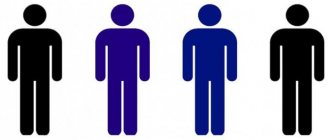Concept of social status
Definition 1
Social status is the position of an individual or social group in society.
A person can simultaneously occupy several status positions; this is called a status set. For example, an individual can simultaneously be a son, a student, a motorist, an athlete, etc.
Social status implies that an individual fulfills a certain social role - that is, the behavior that society expects from him in accordance with his status.
Note 1
Thus, social status simultaneously shows the position of an individual in the system of social relations and determines his duties, rights, privileges, and functions.
Are you an expert in this subject area? We invite you to become the author of the Directory Working Conditions
There are prescribed and acquired statuses, and we can also talk about personal and group status and about vertical and horizontal status.
Basic characteristics of social roles
The basic characteristics of social roles were identified in the mid-20th century by American sociologist Talcott Parsons.
They were offered four characteristics that are common to all roles:
o Scope of role
o How to get a role
o Degree of formalization of the role
o Type of role motivation
Let's touch on these characteristics in a little more detail.
Scope of the role
The scope of the role depends on the range of interpersonal interactions. If it is large, then the scale of the role is also large.
For example, marital social roles are of enormous scale, because There is a wide range of interaction between spouses. From one point of view, their relationships are interpersonal and based on emotional and sensory diversity, but on the other hand, their relationships are regulated by normative acts, and to some extent they are formalized.
Both parties to such social interaction are interested in all sorts of areas of each other’s lives, and their relationship is practically unlimited. In other situations, where relationships are strictly determined by social roles (client-employee, buyer-seller, etc.), interaction is carried out exclusively for a specific reason, and the scale of the role is reduced to a small range of issues relevant to the situation, which means it is very very limited.
How to get a role
The method of obtaining a role depends on the general degree of inevitability for a person of a particular role.
For example, the role of a young man, a man or an old man will be automatically determined by age and gender, and no effort is required to acquire it, although the problem may lie in the person's conformity to his role, which is a given. And if we talk about other roles, then sometimes they need to be achieved and even conquered in the process of life, making specific, targeted efforts for this. For example, the role of a professor, specialist or even student needs to be achieved. Most social roles are associated with people's achievements in professional and other areas.
Degree of formalization of the role
Formalization is a descriptive characteristic of a social role and is determined by the specifics of interpersonal interaction
when one person interacts with others.
Some roles may involve the establishment of only formal relationships between people, and are distinguished by specific rules of behavior; others may be based on informal relationships; and the third ones will generally be a combination of the features of the first two.
Agree that the interaction between a law enforcement officer and a police officer should be determined by a set of formal rules, and the relationship between lovers, having messed up, should be based on feelings.
This is an indicator of the formalization of social roles.
Type of role motivation
What motivates a social role will depend on each individual's motivations and needs.
Different roles will always have different motivations. Thus, when parents care about the welfare of their child, they are guided by feelings of care and love; when a seller seeks to sell a product to a client, his actions may be determined by the desire to increase the organization’s profits and earn his percentage; the role of a person who selflessly helps another will be based on the motives of altruism and performing good deeds, etc.
Social roles are not rigid models of behavior!
People can perceive and perform their social roles differently.
If a person perceives a social role as a rigid mask, the image of which he must conform to always and everywhere, he can completely break his personality and turn his life into suffering. And this should not be done under any circumstances, besides, a person almost always has the opportunity to choose (unless the role, of course, is determined by natural reasons, such as gender, age, etc., although these “problems” are now faced by many people successfully resolved).
Any of us can always learn a new role, which will affect both the person himself and his life.
There is even a special technique for this called image therapy. It means a person “trying on” a new image. However, a person must have the desire to enter a new role. But the most interesting thing is that responsibility for behavior lies not with the person, but with the role that sets new behavioral patterns.
Thus, a person who wants to change begins to act in a new way
even in the most familiar and ordinary situations, revealing your hidden potential and achieving new results. All this suggests that people are capable of “making” themselves and building their lives the way they want, regardless of social roles.
Communication style significantly determines a person’s behavior when interacting with other people.
The specific choice of communication style is determined by many factors: a person’s personal characteristics, his worldview and position in society, the characteristics of this society, and much more.
How many communication styles are there? This question is difficult to answer. However, if we proceed from the fact that a communication style is simply a person’s greater readiness for a particular situation, then we can talk about three main styles. They can be conventionally called ritual, manipulative and humanistic.
.
The ritual style is generated by intergroup situations, the manipulative style by business situations, and the humanistic style by interpersonal situations.
In the future, we will proceed from the fact that communication style is rather a predisposition to a certain communication, direction, readiness for it, which manifests itself in how a person tends to approach most situations.
However, style does not completely determine a person’s communication; he can also communicate in someone else’s style. For example, if a person has a primarily manipulative style, this does not mean that his communication with his closest friend will also be businesslike.
Ritual communication.
Here, the main task of the partners is to maintain connections with society, to reinforce the idea of themselves as a member of society. It is important that the partner in such communication is, as it were, a necessary attribute of the ritual.
In real life, there are a huge number of rituals, sometimes very different situations, in which everyone participates as a kind of “mask” with predetermined properties. These rituals require only one thing from the participants - knowledge of the rules of the game. In this style, many contacts are carried out, which from the outside, and sometimes from the inside, seem meaningless, meaningless, since at first glance they are completely uninformative, do not and cannot have any result.
For example, a birthday.
All those present have known each other for twenty years, get together 3-4 times a year, sit for several hours and talk about the same thing. And not only do the topics of conversation essentially do not change, but in addition, everyone can certainly predict the point of view of anyone on any issue. It would seem that this is an absolutely pointless waste of time, which should only cause irritation.
This also happens, but much more often we enjoy these types of meetings. Why do we need this?
The situation described is a typical case of ritual communication, in which the main thing is to strengthen the connection with one’s group, reinforce one’s attitudes, values, opinions, and increase self-esteem and self-esteem. In ritual communication, a partner is only a necessary attribute, and his individual characteristics are unimportant.
This is true both when we know a person well and when we see him for the first time. Only one thing is important - his competence regarding a specific ritual.
Let us remember the well-known expression that a bore is a person who answers a question. “How do you live9” begins to tell in detail how he lives. In other words, we understand or perceive a person as a bore only when he goes beyond the ritual. If he does not go beyond them (for example, he answers a sacramental question “normally”), then we cannot say anything specific about him, and we don’t need this.
In ritual communication, it is important for us to follow a role - social, professional or interpersonal.
For example, to the question: “How are you living?” you have to answer something like: “normal”, “wonderful”, “excellent”, etc., but the answer is: “disgusting”, suggesting the further question: “What’s so?” and a subsequent conversation on this topic is already a way out of the greeting ritual and a transition to another communication.
A person who answers that he lives disgustingly goes beyond his ritual role.
For ritual communication, it is very important, on the one hand, to correctly recognize the communication situation, and to imagine how to behave in it, on the other.
For example, someone leaves the guests. He is already dressed, standing in the doorway, but still doesn’t leave, he says something, he says
-
ten minutes, half an hour.
The person does not recognize the situation in which the farewell ritual should take place, but continues to exist in a “table conversation” situation. The guest does not fulfill role expectations and begins to be perceived as an annoying, intrusive person.
In many cases we take part in ritual communication with pleasure, in even more situations we participate in it automatically, fulfilling the demands of the situation, with little or no awareness of what we are doing.
We say hello many times to acquaintances and strangers in the same organization, on the landing, on the street, we ask them “How are you?”, we find out what is normal, we talk about the weather, we scold public transport that “does not run well,” and we laugh.
And such communication is also necessary for a person - imagine what your reaction would be if suddenly everyone stopped greeting you. It is clear that the reaction would be far from optimistic, since depriving a person of this ritual directly indicates social isolation and is perceived by him as such.
It follows from this how much importance a person attaches to ritual communication. But ritual communication rarely prevails in life.
It is only a prologue to another communication - manipulative.
Manipulative communication.
This is communication in which the partner is treated as a means of achieving goals external to him.
What is important to demonstrate to your interlocutor in manipulative communication? Only what will help you achieve your goal. In manipulative communication, we “slip” into our partner a stereotype that we consider most beneficial at the moment.
And even if both partners have their own goals of changing the interlocutor’s point of view, the one who turns out to be a more skillful manipulator, i.e., will win. the one who knows the partner better, understands the goals better, and has a better command of communication techniques.
One should not conclude that manipulation is a negative phenomenon.
A huge number of professional tasks involve manipulative communication. In fact, any training (the subject needs to be given new knowledge about the world), persuasion, control always includes manipulative communication.
That is why the effectiveness of these processes largely depends on the degree of mastery of the laws and techniques of manipulative communication.
Manipulative communication is an extremely common type of communication that occurs mainly where there is joint activity. It is important to remember one essential point - a person’s attitude towards manipulative communication and the reverse impact of the manipulative style.
Imagine that you are sitting in the office of a mid-level executive who receives frequent phone calls.
The style of conversation changes all the time. If the opponent's status is higher - one tone, if lower - another. This is a typical example of manipulative communication, and everyone will explain to themselves that “this is how it should be, otherwise you won’t do anything.” However, this is unpleasant for many.
And finally, there is a reverse influence of manipulative communication on the person who uses it.
There is a manipulative deformation of personality in cases where, due to the frequent professional use of manipulative communication, good techniques for its use and, accordingly, constant success in this field, a person begins to consider manipulative communication the only correct one. In this case, all human communication comes down to manipulation (both when it is necessary and when it is completely unjustified).
Humanistic communication.
This is the most personal communication, allowing you to satisfy such human needs as the need for understanding, sympathy, and empathy.
Neither ritual nor manipulative communication can fully satisfy this vital need. The goals of humanistic communication are not fixed or planned initially. Its important feature is that the expected result of communication is not the maintenance of social connections, as in ritual communication, or a change in the partner’s point of view, as in manipulative communication, but a joint change in the ideas of both partners, determined by the depth of communication.
The situations of humanistic communication are known to everyone - these are intimate, confessional, psychotherapeutic communication.
It is connected with the mood and goals of the partners. But here we should point out situations where this communication and even its individual elements are inappropriate.
For example, help desk telephone operators get annoyed with those clients who, instead of quickly asking a question, try to first enter into confidential communication with them: introduce themselves, get to know each other, talk about their problems, reasons for contacting the help desk, etc.
Humanistic communication is determined not so much from the outside (by goal, conditions, situation, stereotypes) as from the inside (by individuality, mood, attitude towards a partner).
This does not mean that humanistic communication does not imply social determination. It is obvious that a person, no matter how he communicates, still remains social (that is, connected with the life and relationships of people in society). However, in this communication (more than in other types) there is a dependence on individuality. In humanistic communication, the partner is perceived holistically, without division into necessary and unnecessary functions, into qualities that are important and unimportant at the moment.
For example, in two hours of conversation we can get to know a random fellow traveler on a train well and be sure that we understood him correctly.
At the same time, we may have little or no understanding of what our manager’s secretary, with whom we “communicate” almost every day for many years in a row, is like as a person.
Our fellow traveler, with whom we spoke openly, trying to understand each other and not pursuing any other goals (what kind of “business” there might be with a stranger), “opened up” to us, we “felt” him.
And communication with a secretary is always of a manipulative nature to one degree or another, therefore, we perceive her very limitedly - only in relation to the functions that she must perform in our affairs.
The main mechanism of influence in humanistic communication is suggestion; suggestion is the most effective of all possible mechanisms.
It is important to remember that this is a mutual suggestion, since both partners trust each other, and therefore the result is not a change in the point of view of one of them, but a mutual joint change in the ideas of both partners.
Prescribed and achieved social status
An individual receives the prescribed status automatically at birth, depending on the place of birth, the family’s position in society, and national and ethnic origin. That is, such status does not depend on a person’s personal efforts and efforts.
For example, the prescribed status: daughter, aristocrat, Kalmyk, etc. Prescribed status is different from natural status because only three statuses are considered natural—sex, race, and nationality. Innate status is inherited apart from consciousness and will. The achieved status is related to the individual's personal achievements and is under his control. We can say that any status that is not automatically granted to a person at the time of birth is achievable.
The achieved status is, for example: writer, father, director, etc. Thus, it is obvious that the achieved status requires independence, awareness and will, and decision-making. It is important to note that the number of cells designed for achieved statuses in society is higher when the society is extremely dynamic and social changes are constantly taking place in it.
Finished works on a similar topic
Course work Typology of social statuses 490 ₽ Abstract Typology of social statuses 220 ₽ Test paper Typology of social statuses 250 ₽
Receive completed work or specialist advice on your educational project Find out the cost
Social status in life
If anyone doesn’t know what is better to choose - to strive to occupy a certain status or to “forget” everyone and just live, I will clarify one more important point: a person with social status is one who is controlled by others (the crowd). Because, as I wrote above, today the situation can change quickly.
Any group of people needs, at a minimum, an organizer, and at a maximum, a leader - a person who will be responsible for everything. This is where a social hierarchy begins to form, where someone occupies a higher or lower position.
This means that a person who wants to succeed with a group must become someone who can make a significant contribution to achieving their goals. If you are not able to give people at least something, no one will follow you, which means that no one needs you.
As it was said in the TV series "House": "When a person is such a bastard, he is either a genius or unemployed." Accordingly, someone with a position in the group must say and do what others want to hear and see from him. Or be a genius who can be forgiven for everything. But, in any case, he is a “slave of the lamp” who must fulfill the wishes of the crowd or at least a separate group.
Therefore, single people can feel real freedom, without having any responsibility to others, and say whatever they want... but really, only in front of the mirror. In general, as someone said: “the real prison is only in the head.” The importance of having or not having a position in society is nothing more than an illusion. You need to live in a way that is convenient for you, the rest is not important. For example, Pierce Brosnan, when he starred in Bond, gave up on everyone and just started spending money. Of course, he’s still filming now, but he doesn’t have his former glory, but he has a lot of money. And there are plenty of such examples.
The influence of social status in society
So, now the most important thing is that in order to live happily, is it necessary to occupy a certain position in society? Not really, provided you don't mind the isolation.
The fact is that people at the genetic level are structured in such a way that in order to survive they need social groups and individuals who can lead them. This is a kind of shifting responsibility and searching for like-minded people.
To make it clearer, I will give an example from YouTube:
A truck driver from Russia will not be impressed by the Ukrainian president’s speech that officials should put a photo of their family in their offices instead of the head of state. The driver would have to raise his salary by 10 thousand, but whose photo the politician will have – he doesn’t care. At the same time, a representative of the aristocratic intelligentsia will be impressed by the president’s speech, and he will wish such a president for his country, not understanding how one can be so “petty” because of 10 thousand without thinking about the “highest”.
That is, in life, people, just like on FB or VK, are divided into groups of like-minded people. The intelligentsia unites with the intelligentsia, quitters with quitters, dummies with dummies, hard workers with hard workers, and so on. There they hear only what they like, and anyone who disagrees is sent to a “ban.”
At the same time, there have always been “lone wolves”. But a loner is a person who does everything himself. In ancient times, this required being able to chop wood, build a hut, and shoot a deer. Today, a single person should be able to sit through a working day in the office, pay for utilities and go to Pyaterochka. Therefore, everyone is free to determine for themselves the importance of social status. There are people for whom universal recognition is more important than air, and there are those who don’t care about anyone, just to live to see their salary. In general, the 21st century has given us complete freedom, and everyone lives as they want.
The influence of social status in relationships
Many people complain that women are materialistic. In fact, men are not inferior in prudence, they just complain about girls more. But speaking to the point: a couple, a civil relationship or a family is also a group, just a very small one. Therefore, at the genetic level, the same structure of relationships operates as during the formation of large social communities.
Therefore, in order for things to go easier when communicating with girls, you need to find friends either from your social circle, or “throw dust in your eyes.”
Recently, a programmer on one of the projects where I work complained that when he tells girls about business on the Internet, they lose interest in it. The fact is that the guy works as a freelancer and has launched two of his own online stores. But the girls are not impressed, despite the fact that he cannot be called poor in material terms.
I suggested slightly changing the format of my “resume” - to say that he is an entrepreneur, an IT specialist, and since he is in demand, he works with different people. Now he has launched two of his projects and plans to develop further. That is, he didn’t lie, he even has an individual entrepreneur, but he presented who he is a little differently. After all, it’s one thing to be an IT specialist, and another to be a seller and freelancer. In general, it worked.
Well, if someone doesn’t want to strive for social status for the sake of a relationship, Pornhub can help him. Because men love beautiful girls. And women spend time, effort and money on beauty in order to be able to choose those who have more influence on society.
Personal and group social status
Personal status: associated with the level of the small group (for example, family or work team) in which the individual constantly functions. This status will be determined using character traits and personal qualities, characteristics of the individual.
Group status: associated with the level of a large group (ethnicity, social class, nationality). Such status will be associated not only with personal qualities, it will depend on how and to what extent the individual is a representative and bearer of the right to be a member of a large social group.
Vertical and horizontal social status
This typology is associated with the concept of R. Boudon. In his opinion, status has two dimensions - horizontal and vertical. In the horizontal dimension, a system of social relationships occurs between individuals - status holders who are at the same level of the social ladder. In the vertical dimension, accordingly, relationships can occur between individuals whose social statuses are at different levels of the social ladder.
Based on this idea, Boudon defines social status as a set of equal and hierarchical relationships maintained by an individual with other members of society.
We can also talk about dividing social statuses into formal and informal. The first are related to the fact that such status will be enshrined in some official document (for example, the status of a director). The latter are associated with statuses that are not officially established anywhere (for example, “the soul of the company”).









